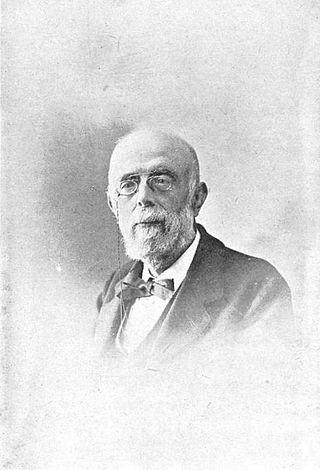Related Research Articles

Marcelino Menéndez y Pelayo was a Spanish scholar, historian and literary critic. Even though his main interest was the history of ideas, and Hispanic philology in general, he also cultivated poetry, translation and philosophy. He was nominated for the Nobel Prize in Literature five times.
Yñigo, Íñigo, or Iñigo Ortiz de Retes was a 16th-century Spanish maritime explorer of Basque origin, who navigated the northern coastline of the Pacific–Melanesian island of New Guinea and is credited with bestowing its current name.

Father Francisco Noronha was a Spanish physician and botanist who resided for some time at Manila, Luzon, Philippines, where he took much effort to organize the Royal Botanic Garden and stock it with valuable plants. Three sets of his water-colour drawings of Javan plants and one set of 108 numbered drawings still exist. Williams (2003) describes him as "a Spanish physician and botanist who had visited Madagascar", while Zuidervaart & Van Gent (2004) call him "a capable botanist from Manila" who in 1786 had taken over supervision of the museum of the Batavian Society of Arts and Sciences in Java.
Miguel Asín Palacios was a Spanish scholar of Islamic studies and the Arabic language, and a Roman Catholic priest. He is primarily known for suggesting Muslim sources for ideas and motifs present in Dante's Divine Comedy, which he discusses in his book La Escatología musulmana en la Divina Comedia (1919). He wrote on medieval Islam, extensively on al-Ghazali. A major book El Islam cristianizado (1931) presents a study of Sufism through the works of Muhyiddin ibn 'Arabi of Murcia in Andalusia. Asín also published other comparative articles regarding certain Islamic influences on Christianity and on mysticism in Spain.
Andrés de Claramonte y Corroy was a playwright of the Spanish Golden Age. Very few facts are known about his life. As an actor, he worked for the most important companies, such as Baltasar de Pinedo's or Alonso de Olmedo's. As a playwright, he wrote dramas with great epic style, in which he showed his talent for visual and theatrical effects.
Emilio García Gómez, 1st Count of Alixares was a Spanish Arabist, literary historian and critic, whose talent as a poet enriched his many translations from Arabic.
Luce López-Baralt is a prominent Puerto Rican scholar and essayist and a professor of Spanish and Comparative Literature at the University of Puerto Rico.
Julián Ribera y Tarragó was a Spanish Arabist and academic.

The Centre for Political and Constitutional Studies, previously known as the Institute for Political Studies, is an autonomous agency associated with the Ministry for the Presidency of Spain.

Menéndez Pelayo International University is a public university with administrative headquarters in Madrid and campuses in Santander, Valencia, Barcelona, Cartagena, Cuenca, Granada, La Línea de la Concepción, Seville and Tenerife. The University also conducts classes at the Luis Seoane Foundation in A Coruña and the Huesca campus of the University of Zaragoza.
Rafael de Floranes or de Floranes Vélez de Robles y Encinas was a Spanish historian, jurist and writer.

Menéndez Pelayo is a station on Line 1 of the Madrid Metro. It is located in Zone A. It was opened on 8 May 1923. It is named for the Avenida de Menéndez Pelayo, which is named in turn for the scholar Marcelino Menéndez y Pelayo (1856–1912).
Events in the year 1912 in Spain.

The Civil Order of Alfonso XII is a Spanish honorific decoration named for King Alfonso XII (1857–1885). It was established by Royal Decree on 23 May 1902 to reward achievements in education, science, culture, teaching and research.

Francisco Codera y Zaidín was a Spanish historian, philologist and Arabist scholar. Among his students, known in the academic field as the Beni Codera, were Arabists Rafael Altamira and José Deleito.

The statue of Marcelino Menéndez y Pelayo is a monument in Madrid, Spain. A work by Lorenzo Coullaut Valera, it consists of a limestone statue of the aforementioned philologist and it is installed in the lobby of the National Library of Spain.

Miquel Costa i Llobera was a Spanish poet from Majorca. He mainly wrote in Catalan language and is regarded as a prominent figure of Catalan poetry.

Francisco de Aldana was a military man and one of the most important poets in the Spanish language of the 16th century, in the second phase of the Spanish Renaissance.

Francisco Rodríguez Marín was a Spanish poet, paremiologist, and lexicologist.

Agustín González de Amezúa y Mayo was a Spanish academic, member of Real Academia Española, Real Academia de la Historia and Real Academia de Jurisprudencia y Legislación. He is best known as historian of literature who specialized in Siglo de Oro, especially in works of Cervantes and Lope de Vega. He held various important scientific posts during early Francoism, especially in Consejo Superior de Investigaciónes Científicas. Politically he supported the Traditionalist cause, first as an Integrist and then as a Carlist militant; in the early 1940s he was in national executive of Comunión Tradicionalista. In the mid-1920s he was member of the Madrid ayuntamiento.
References
- 1 2 3 4 Cejador Frauca 1919, p. 153.
- ↑ López García 2013.
- ↑ Menéndez y Pelayo 1899, p. 948.